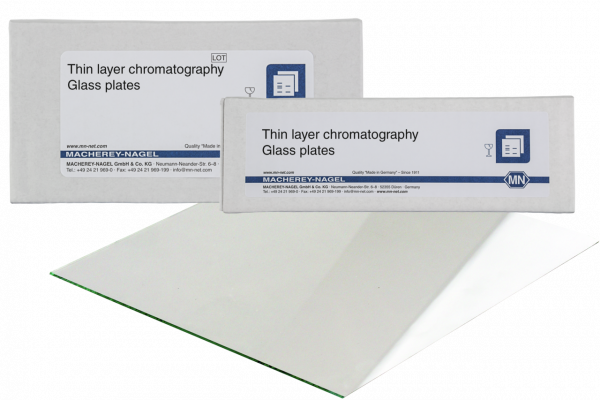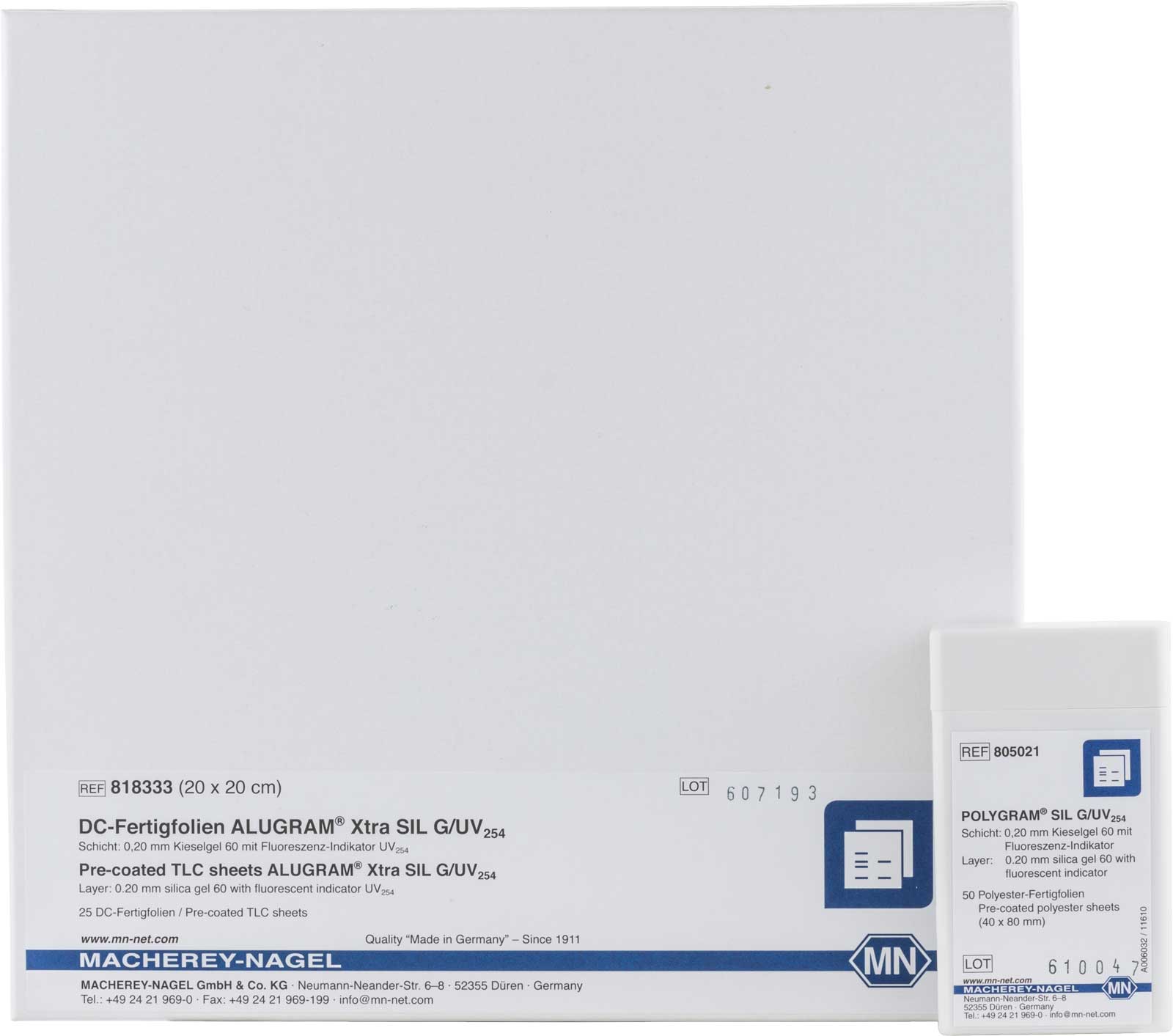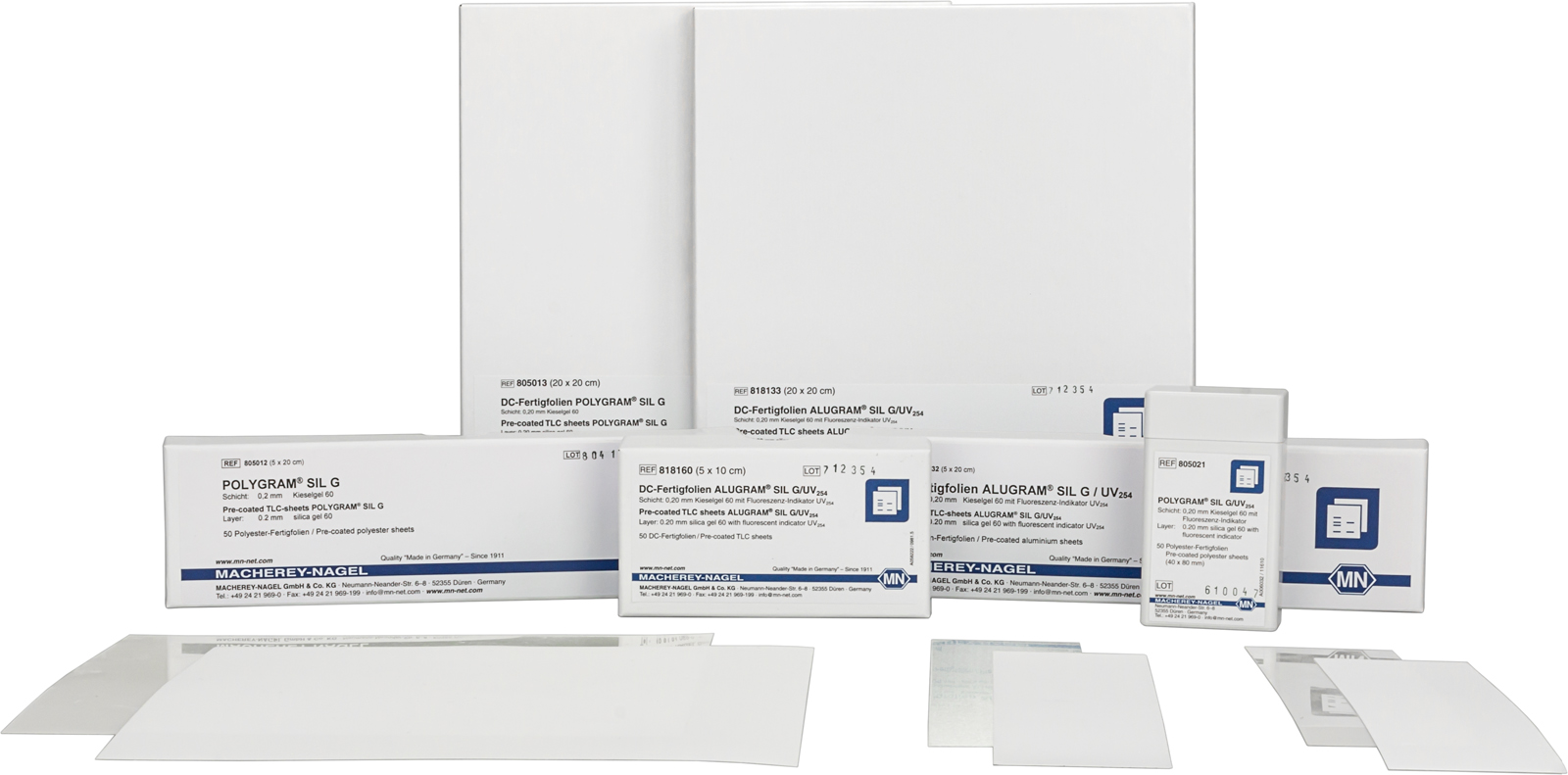TLC glass plates, silica gel layer, SIL G-25 HR, 20x20 cm

*taxes and shipping not included
Delivery time approx. 5 working days
TLC glass plates in different plate sizes for many different applications, coated with unmodified high purity silica gel (SiOH).
| Method | Thin layer chromatography (TLC) |
| Brand | SIL G |
| Phase | SIL G-25 HR |
| Base material | Glass plates coated with silica gel |
| Surface chemistry | Unmodified high purity silica gel (SiOH) |
| Mode | Normal phase (NP) |
| Plate size | 20x20 cm |
| Layer thickness | 0.25 mm |
| Layer hardness | Standard, soft |
| UV indicator | No |
| Support material / backing | Glass |
| Particle size | 5–17 µm |
| Particle type | Fully porous particles (FPP) |
| Particle shape | Irregular |
| Pore size | 60 Å |
| Pore volume | 0.75 mL/g |
| Binder | Yes |
| pH stability | 2.0–8.0 |
| Recommended application(s) | Aflatoxins |
| Temperature stability | High |
| Storage temperature | 15–25 °C / 59–77 °F |
| Scope of delivery | 25x TLC glass plates (20x20 cm) |
| Gross weight (incl. packaging) | 3556 g / 7.84 lbs |
| Packaging dimensions | 237 x 235 x 80 mm / 9.33 x 9.25 x 3.15 Inch |
| Hazardous material | No |
MACHEREY‑NAGEL – TLC for more than 5 decades
We offer ready-to-use layers for TLC and HPTLC
- Comprehensive range of plate sizes, surface chemistries and backings
- Pre-coated plates ready for immediate use
- Homogeneous, smooth and well adhering layers
- Available with UV indicator or non-impregnated
- Consistent high quality from batch-to-batch and from plate-to-plate
Standard analytical TLC plates and sheets
Thin layer chromatography can be used for both qualitative and quantitative analysis. Standard analytical TLC plates typically have adsorbent layers that are nominally between 0.20–0.25 mm in thickness. Particle size is about 5–17 µm.
Preparative TLC plates
Preparative TLC is used for purification and isolation of analytes from impurities. Preparative TLC layers (≥ 0.5 mm) are only on glass plates available. For 2 mm preparative layers a slightly coarser material is used.
TLC / HPTLC plates and sheets
Most commonly used silica gel layers
SIL G
- Standard layer (soft)
- Thicker layers for preparative TLC (PLC) on glass plates
- Available on glass plates, polyester and aluminum sheets
ADAMANT
- Outstanding hardness and abrasion resistance
- Excellent separation efficiency
- Low-noise background of the layer
- Available on glass plates
SIL HD
- Hard layer with good abrasion resistance
- High luminosity
- Brilliant staining properties (e.g., with potassium permanganate - KMnO₄)
- Excellent separation efficiency
- Good wettability for precise colorization results – even with 100 % aqueous detection reagents
- Low-noise background of the layer
- Available on glass plates
| Physical properties | |||
| Material | glass | polyester | aluminum |
| Thickness (approx.) | 1.3 mm | 0.2 mm | 0.15 mm |
| Weight, packaging and storage requirements | high | low | low |
| Torsional strength | ideal | low | relatively high |
| Temperature stability | high | max. 185 °C | high |
| Susceptible to breakage | yes | no | no |
| Can be cut with scissors | no | yes | yes |
| Chemical resistance of backing material | |||
| Against solvents | high | high | high |
| Against mineral acids and conc. ammonia | high | high | low |
| Stability of binder system of NP plates in water | |||
| Suitability for aqueous detection reagents | depends on phases (layer) | good | ALUGRAM: low to moderate |
| ALUGRAM Xtra: moderate to high |
MN defines HPTLC products as follows
At least one of the following criteria must be fulfilled
- Layers with particle size 2–10 µm
- Layers with prefix "Nano"
- All modified layers
Narrow fractionation of the silica particles allows
- Sharper separations
- Shorter developing times
- Shorter migration distances
- Smaller samples needed
- Increased detection sensitivity
(compared to TLC)
- Indicators: manganese activated zinc silicate with green fluorescence for short-wave UV (254 nm); special inorganic fluorescent pigment with blue fluorescence for long-wave UV (366 nm)
- Binders: highly polymeric products, which are stable in almost all organic solvents and resistant towards aggressive visualization reagents. The binders are also contain gypsum (calcium sulfate hemi- or dihydrate). The binder composition is proprietary.
TLC / HPTLC backings
Glass
Glass plates are robust, heat proof and chemically resistant to all common mobile phases and visualization reagents.
- Thickness (approx.): 1.3 mm
- Weight and storage requirements: high
- Torsional strength: ideal
- Temperature stability: high
- Susceptible to breakage: yes
- Can be cut with scissors: no
- Chemical resistance against solvents: high
- Chemical resistance against mineral acids and conc. ammonia: high
- Suitability for aqueous detection reagents: depends on phases (layer)
Polyester – POLYGRAM sheets
Polyester sheets are easy to handle, lightweight and flexible. Can be cut with scissors. Developed POLYGRAM sheets can also be stored for documentation in laboratory notebooks.
- Thickness (approx.): 0.2 mm
- Weight and storage requirements: low
- Torsional strength: low
- Temperature stability: max. 185 °C
- Susceptible to breakage: no
- Can be cut with scissors: yes
- Chemical resistance against solvents: high
- Chemical resistance against mineral acids and conc. ammonia: high
- Suitability for aqueous detection reagents: good
Aluminum – ALUGRAM (Xtra) sheets
Aluminum sheets are easy to handle, lightweight and flexible. High performance silica on ALUGRAM Xtra sheets provides outstanding wettability for precise colorization results, even with 100 % aqueous detection reagents. Moreover ALUGRAM Xtra sheets are easy to cut with scissors. No flaking of silica occurs!
- Thickness (approx.): 0.15 mm
- Weight and storage requirements: low
- Torsional strength: relatively high
- Temperature stability: high
- Susceptible to breakage: no
- Can be cut with scissors: yes
- Chemical resistance against solvents: high
- Chemical resistance against mineral acids and conc. ammonia: low
- Suitability for aqueous detection reagents: ALUGRAM: low to moderate, ALUGRAM Xtra: moderate to high


Short introduction video (EN) about TLC and HPTLC products from MACHEREY-NAGEL
How to cut our TLC sheets
The video explains the correct position of the scissors for a clean cut of a TLC/HPTLC sheet.
Please note that the scissors must be held slightly to the right when cutting. If the scissors are tilted to the left or held straight, the coating may flake off.
 TLC developing chamber, up to 2 plates/sheets simultaneous, format max. 10x10 cm
TLC developing chamber, up to 2 plates/sheets simultaneous, format max. 10x10 cm  TLC developing chamber, up to 5 plates/sheets simultaneous, format max. 20x20 cm
TLC developing chamber, up to 5 plates/sheets simultaneous, format max. 20x20 cm 





